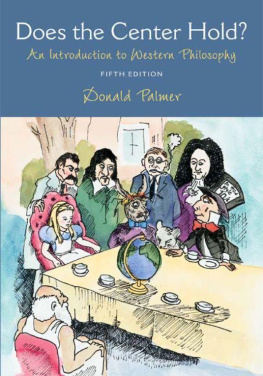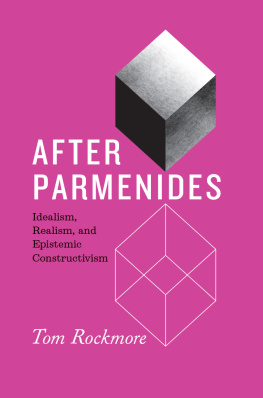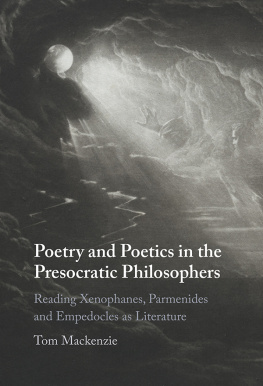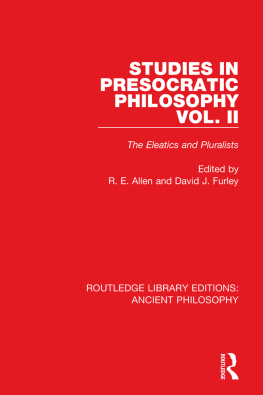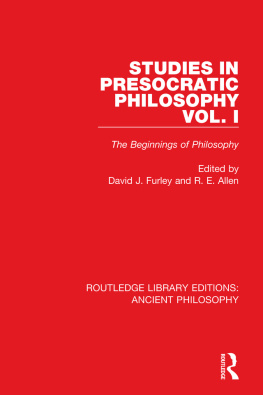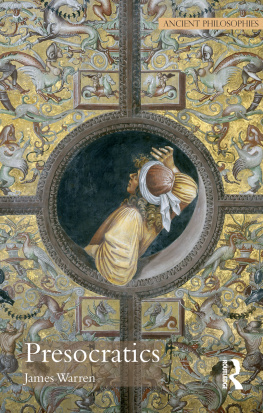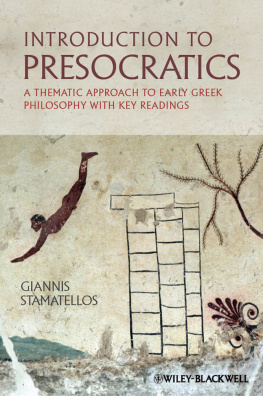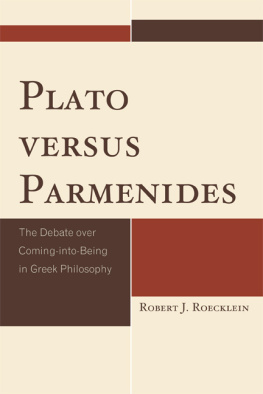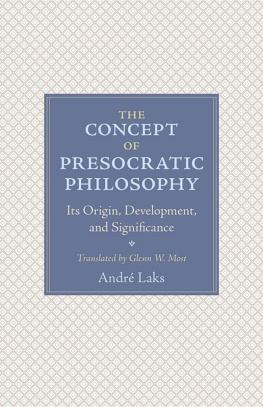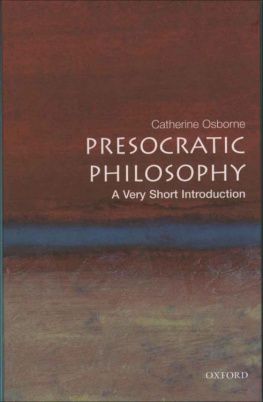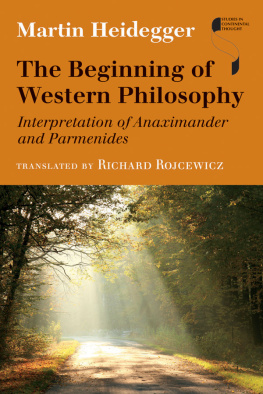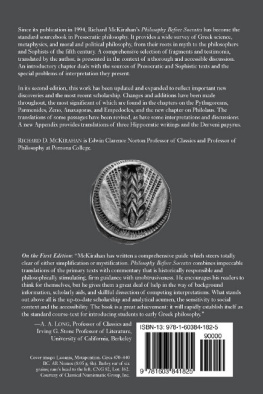Palmer - Parmenides and Presocratic Philosophy
Here you can read online Palmer - Parmenides and Presocratic Philosophy full text of the book (entire story) in english for free. Download pdf and epub, get meaning, cover and reviews about this ebook. year: 2009, publisher: Oxford University Press, Incorporated, genre: Religion. Description of the work, (preface) as well as reviews are available. Best literature library LitArk.com created for fans of good reading and offers a wide selection of genres:
Romance novel
Science fiction
Adventure
Detective
Science
History
Home and family
Prose
Art
Politics
Computer
Non-fiction
Religion
Business
Children
Humor
Choose a favorite category and find really read worthwhile books. Enjoy immersion in the world of imagination, feel the emotions of the characters or learn something new for yourself, make an fascinating discovery.

- Book:Parmenides and Presocratic Philosophy
- Author:
- Publisher:Oxford University Press, Incorporated
- Genre:
- Year:2009
- Rating:4 / 5
- Favourites:Add to favourites
- Your mark:
- 80
- 1
- 2
- 3
- 4
- 5
Parmenides and Presocratic Philosophy: summary, description and annotation
We offer to read an annotation, description, summary or preface (depends on what the author of the book "Parmenides and Presocratic Philosophy" wrote himself). If you haven't found the necessary information about the book — write in the comments, we will try to find it.
Palmer: author's other books
Who wrote Parmenides and Presocratic Philosophy? Find out the surname, the name of the author of the book and a list of all author's works by series.
Parmenides and Presocratic Philosophy — read online for free the complete book (whole text) full work
Below is the text of the book, divided by pages. System saving the place of the last page read, allows you to conveniently read the book "Parmenides and Presocratic Philosophy" online for free, without having to search again every time where you left off. Put a bookmark, and you can go to the page where you finished reading at any time.
Font size:
Interval:
Bookmark:
PARMENIDES AND PRESOCRATIC PHILOSOPHY
JOHN PALMER


Great Clarendon Street, Oxford OX2 6DP
Oxford University Press is a department of the University of Oxford.
It furthers the Universitys objective of excellence in research, scholarship,
and education by publishing worldwide in
Oxford New York
Auckland Cape Town Dar es Salaam Hong Kong Karachi
Kuala Lumpur Madrid Melbourne Mexico City Nairobi
New Delhi Shanghai Taipei Toronto
With offices in
Argentina Austria Brazil Chile Czech Republic France Greece
Guatemala Hungary Italy Japan Poland Portugal Singapore
South Korea Switzerland Thailand Turkey Ukraine Vietnam
Oxford is a registered trade mark of Oxford University Press
in the UK and in certain other countries
Published in the United States
by Oxford University Press Inc., New York
John Palmer 2009
The moral rights of the author have been asserted
Database right Oxford University Press (maker)
First published 2009
All rights reserved. No part of this publication may be reproduced,
stored in a retrieval system, or transmitted, in any form or by any means,
without the prior permission in writing of Oxford University Press,
or as expressly permitted by law, or under terms agreed with the appropriate
reprographics rights organization. Enquiries concerning reproduction
outside the scope of the above should be sent to the Rights Department,
Oxford University Press, at the address above
You must not circulate this book in any other binding or cover
and you must impose the same condition on any acquirer
British Library Cataloguing in Publication Data
Data available
Library of Congress Cataloging in Publication Data
Library of Congress Control Number: 2009934148
Typeset by SPI Publisher Services, Pondicherry, India
Printed in Great Britain
on acid-free paper by
CPI Antony Rowe, Chippenham, Wiltshire
ISBN 9780199567904
1 3 5 7 9 10 8 6 4 2
For Elizabeth
Uxori carissimae
Parmenides of Elea is the most brilliant and controversial of the Presocratic philosophers. This book aims to achieve a better understanding of his thought and of his place in the history of early Greek philosophy. To this end, I here develop and defend a modal interpretation of the ways of inquiry that define Parmenides philosophical outlook. He was, on this view, the first to have distinguished in a rigorous manner the modalities of necessary being, necessary nonbeing or impossibility, and contingent being. He himself specifies these modalities as what is and cannot not be, what is not and must not be, and what is and is not. Accompanying this fundamental ontological distinction is a set of epistemological distinctions that associates a distinct form of cognition with each mode of being. With this framework in place, Parmenides proceeds to consider what what must be will have to be like just in virtue of its mode of being and then to present an account of the origins and operation of the worlds mutable population. In defending the modal interpretation, it will be necessary to go beyond issues internal to Parmenides poem and to consider his relation to other Presocratic philosophers. For Parmenides has typically been viewed, in one way or another, as a pivotal figure in the development of early Greek natural philosophy, in that his arguments are supposed to have had a decisive impact on the physical theories of his immediate successors. Showing where such views are mistaken will strengthen the case for the modal interpretation, both by removing external obstacles to its acceptance and by demonstrating how it makes possible a more historically accurate understanding of Parmenides place in Presocratic philosophy.
I hope this book will be of interest, not only to specialists in ancient philosophy, but also to philosophers and classicists working in other areas, as well as to students, at both the graduate and the more advanced undergraduate levels. I have therefore tried to make the material as accessible as possible to those with only a modest acquaintance with Presocratic philosophy without, however, minimizing the complexities involved in efforts to understand Parmenides philosophical achievement. retrospective summary before saying something about Parmenides place within the main tradition of Presocratic metaphysical and cosmological speculation.
The argumentation here will, of necessity, be at once philosophical and philological. Assessing the significance of any philosophers ideas evidently requires that one first engage in whatever interpretive work is required to determine just what those ideas were. When dealing with a contemporary or near-contemporary thinker working in roughly the same philosophical tradition as oneself, the interpretive difficulties involved in understanding her views may be no greater, or at least not significantly greater, than those involved in understanding what any other contemporary speaker of ones own language may have to say. The difficulties tend to multiply, however, with cultural and temporal distance. Thus historians of philosophy must bring to bear an array of hermeneutical and even philological skills in addition to philosophical acumen. Although some philosophers may find the hermeneutic dimension of the history of their discipline frustrating, there is no escaping the fact that interpretive reconstruction of the views of earlier thinkers inevitably precedes assessment of the philosophical importance and influence of their views. Of course, a good deal of philosophical skill is typically necessary at the interpretive stage, but the basic point remains: before assessing a historical thinkers views, one must do whatever may be required to determine just what those views were.
If one wishes to judge for oneself what Parmenides views were and how they contributed to philosophys early development, one soon encounters all manner of difficulties. Where fortune has preserved portions of Parmenides work, it is often difficult to determine just what he wrote; for there are numerous places in the fragments of his poem where the vagaries of transmission have left an uncertain text. In an effort not to burden the philosophically minded reader with more philological discussion than is strictly necessary, the appendix presents the text of the fragments of Parmenides poem, a translation, and accompanying notes on textual issues. Readers may find it useful at least to peruse this appendix before proceeding to the chapters that develop the modal interpretation. The appendix will in any case provide a ready point of reference during development of the modal interpretation in . Even in places where one can be reasonably certain about what words Parmenides wrote, their syntactical construal and even the sense of individual words can be unclear. This is not surprising, given the partial preservation of his poem, his archaic form of expression, and the challenge of finding a way to express his novel ideas in epic hexameter. Where the construal of his words seems secure, what he was attempting to communicate can still remain opaque so that one may mistake the broader philosophical significance of his claims.
Reading Parmenides requires that one confront interpretive problems at almost every step of the way. It has therefore seemed natural to present the case for the interpretation I have come to find most compelling by recording the interpretive choices made in developing it. This is particularly the case early on, especially in the treatment of fragment 2, since any misstep at this stage inevitably leads to further misunderstanding of Parmenides claims in the remainder of the poem. The case for adopting the modal interpretation of Parmenides ways of inquiry thus emerges from considering the key interpretive problems encountered in fragment 2 as well as the tensions and unresolved difficulties inherent in some of the most prominent interpretive responses to them, particularly in the Russellian line perhaps most familiar to philosophers today. Although there is extensive discussion of other interpretive options, this discussion is never merely for the sake of exhaustiveness. It is no part of my agenda to provide a comprehensive survey of previous scholarship or to make a display of industry by ensuring that reference is made to as much of the literature as possible. References to others work is made as the argument requires. Although there will be criticism of others interpretive choices, I want to make it clear at the outset that I feel deeply indebted to many of the scholars whose views I discuss, even when I disagree with them, for their efforts to understand Parmenides and his place in the development of Presocratic philosophy have given shape to my own engagement with this material.
Next pageFont size:
Interval:
Bookmark:
Similar books «Parmenides and Presocratic Philosophy»
Look at similar books to Parmenides and Presocratic Philosophy. We have selected literature similar in name and meaning in the hope of providing readers with more options to find new, interesting, not yet read works.
Discussion, reviews of the book Parmenides and Presocratic Philosophy and just readers' own opinions. Leave your comments, write what you think about the work, its meaning or the main characters. Specify what exactly you liked and what you didn't like, and why you think so.





